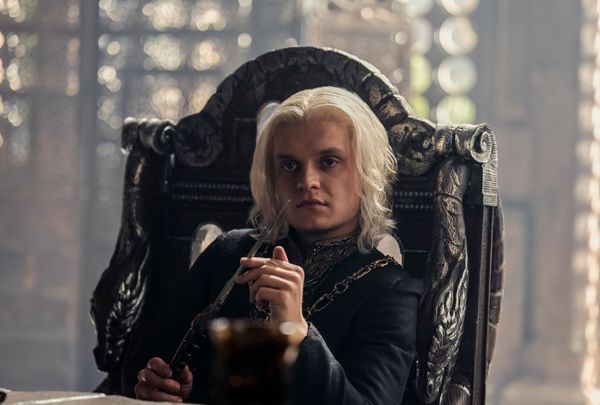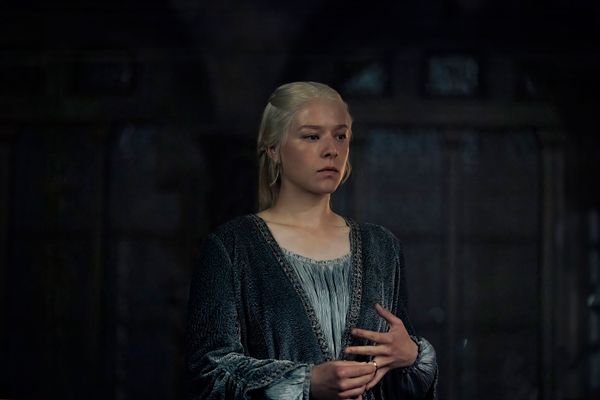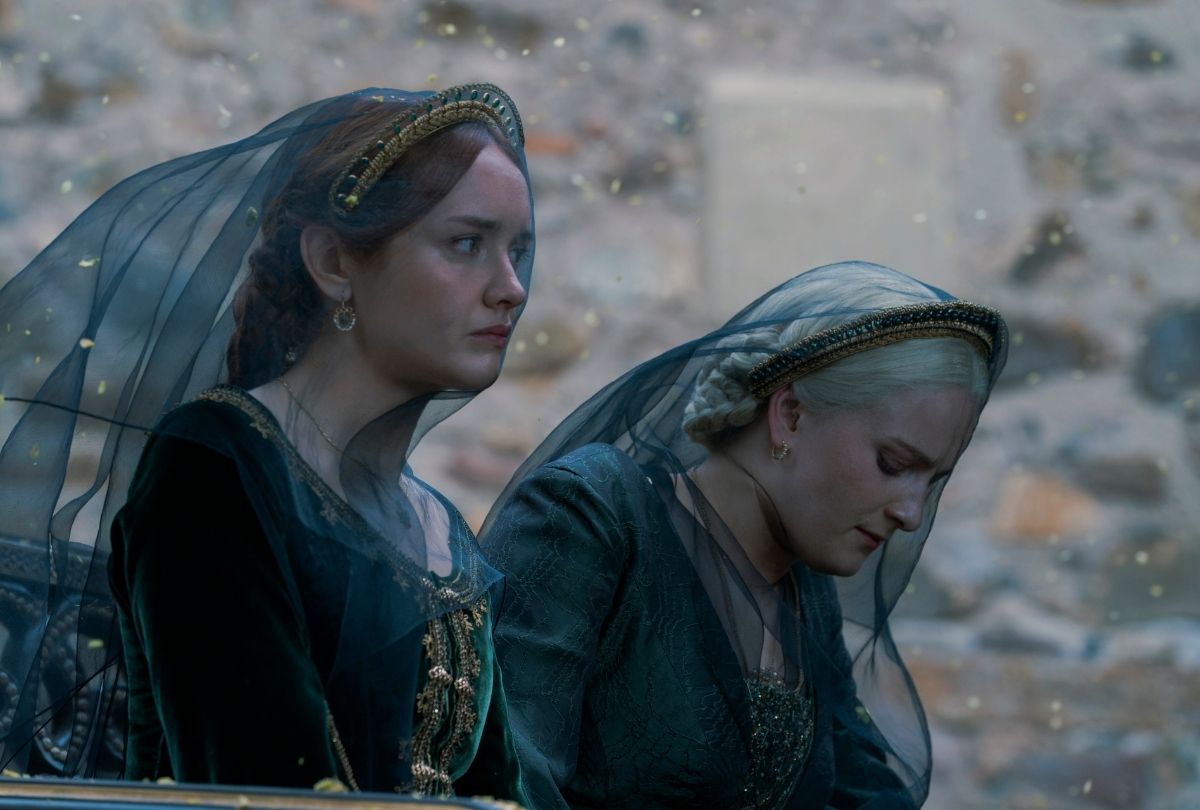When dragons go to war, everything burns. But who bears the emotional cost of the conflagration?
The second season of “House of the Dragon” presents us with a clear answer: In Westeros, a kingdom steeped in gender normativity, the female figures in Houses Green and Black are made to shoulder the weight of grief most acutely.
Their burdens will be doubled.
This season, with a knife at her throat, Queen Helaena (Phia Saban) is forced to identify her son Jaehaerys' (Jude Rock) to an assassin who lops his head off as retribution for the death of the enemy family's high-ranking son, Lucerys (Elliot Grihault). Helaena has suffered a devastating loss and is left traumatized by the ordeal, and her mother the Dowager Queen Alicent (Olivia Cooke) laments the situation.
“The child is dead. His pain is ended. But what they’ve done to my girl –” Alicent blubbers, her typically stoic facade faltering. “And what if the hand that’s done it is not who must be blamed? The gods punish us. They punish me.”
That punishment hasn't ended, for her or for her daughter. In fact, their burdens will be doubled.
Seeking to splinter public support for the “pretender to the throne” by painting rival Rhaenyra (Emma D'Arcy) as a babeslayer, Alicent's father Otto (Rhys Ifans) – Hand of the King to her son and Jaehaerys’ father, Aegon (Tom Glynn-Carney) – presents an idea. They will hold a public funeral procession for Jaehaerys in which both Alicent and Helaena will ride alongside the body of the dead prince, so that their mourning is public for the people to see.
“Let no one say I do not grieve,” Otto says. “The realm must see the sorrow of the crown. A sorrow best expressed by its through its most gentle souls. I think you’ll all agree the king himself must be spared."
Grief, as it’s portrayed in “House of the Dragon,” perpetuates antiquated ideas of men’s roles versus women’s in Westeros and exacerbates existing gender divides. Rhaenyra’s very existence as Viserys’ named female heir is perhaps the most obvious example of this division. The infighting that culminates in the Dance of the Dragons spawns from discontent over the mere thought of having a female leader.
And repeatedly, we see these women called to serve in some public capacity even as they mourn losses. They are unfairly saddled with performance, with enduring not despite their grief but because of it. There is a double standard between the sexes in how emotions are acceptably displayed, fostered by a hierarchy of emotional labor in which women occupy the bottom rung.
 Tom Glynn Carney in "House of the Dragon" (HBO) (HBO)This implied system is why Otto parades Alicent and Helaena through the streets of King’s Landing, despite their deep discomfort with the theatrics of it all, and permits Aegon the Incompetent and Impetuous to wallow within the walls of the Red Keep. It’s a form of compassion born partly out of necessity, as underscoring Aegon’s instability would only exacerbate his perceived weakness.
Tom Glynn Carney in "House of the Dragon" (HBO) (HBO)This implied system is why Otto parades Alicent and Helaena through the streets of King’s Landing, despite their deep discomfort with the theatrics of it all, and permits Aegon the Incompetent and Impetuous to wallow within the walls of the Red Keep. It’s a form of compassion born partly out of necessity, as underscoring Aegon’s instability would only exacerbate his perceived weakness.
But it’s also the case that any man in this feudal society would never willingly choose to make a spectacle of his grief. Pervasive toxic masculinity is no nascent phenomenon. In “House of the Dragon,” the notion of what it means to be a man — to be a king — is in decidedly dire straits, its progressive progress stymied by a culture of misogyny in which men can only express themselves through rage. In this world, a crying king is an aberration, and an angry woman is delineated, not as strong, but as a “c**t.”
During the procession, the mother and daughter appear side by side wearing gossamer funeral veils, as thousands of wailing smallfolk swarm around them shouting condolences. The carriage ferrying Jaehaerys’ body snags in the mud, and his sutured head teeters unsteadily as soldiers attempt to dislodge the vessel. Helaena whimpers and winces, thrashing in anguish while Alicent tries to mollify her. “A curse, a curse on Rhaenyra the monstrous,” one wizened citizen cries.
The entire spectacle is a grim domino effect of female grief, molded and perpetuated by men in power.
Even Aegon’s immediate assumption that Rhaenyra is behind Jaehaerys’ killing is a reinforcement of the series’ emphasis on gender normativity. Though her grief over her own son Lucerys' death drove her to seek a balancing of the scales, it was in fact her husband Daemon Targaryen (Matt Smith) who commissioned the killing of the princeling.
Westerosi society requires its women to engage in performative outward displays of grief though their internal pain is undeniably real.
The emotional strangeness behind Aegon and Helaena’s relationship as both siblings and husband and wife complicates Jaehaerys’ murder even further. In the second episode’s behind-the-scenes snippets, Glynn-Carney claims that “Aegon feels completely alone. No one really understands or appreciates the pain he’s in. And I think we see why Aegon’s respect for Helaena grows, because she’s the only other person in this environment that really knows what this pain is.”
The actor is speaking of a brief moment in which the siblings cross on the castle stairs — Aegon, followed tightly by two Kingsguards, looks at his sister briefly with an expressionless gaze. She nods silently.
Rather than serving as a moment of quiet empathy between two grieving parents, as Glynn-Carney suggests, this flaccid interaction is its antithesis, as the most watered-down way the royal pair can come together in the face of extreme tragedy.
 Emma D'Arcy as Rhaenyra Targaryen in "House of the Dragon" (HBO)Meanwhile, Rhaenyra is in a parallel position. When she says, “Having lost my own son, that I would inflict such a thing on Helaena of all people," these words uttered in incredulous self-defense show infinitely more care for the opposing queen than she receives from her own husband or grandsire. But perhaps it's not that much of a surprise. After all, Rhaenyra knows what it's like to mourn and yet still have the world expect strength from her.
Emma D'Arcy as Rhaenyra Targaryen in "House of the Dragon" (HBO)Meanwhile, Rhaenyra is in a parallel position. When she says, “Having lost my own son, that I would inflict such a thing on Helaena of all people," these words uttered in incredulous self-defense show infinitely more care for the opposing queen than she receives from her own husband or grandsire. But perhaps it's not that much of a surprise. After all, Rhaenyra knows what it's like to mourn and yet still have the world expect strength from her.
This plays out when she goes to seek out her son's remains, but her husband Daemon is left behind and demanding action. He implores his cousin Rhaenys (Eve Best), to fly with him to King’s Landing to slay the dragon who killed Lucerys.
“Was this the queen’s command?” Rhaenys asks.
“The queen remains absent,” a clearly exasperated Daemon replies. “She has been gone for days. Too long. She is exposed.”
“She is grieving!” says Rhaenys, The Queen Who Never Was.
“The mother grieves as the queen shirks her duties!” Daemon argues.
As with Otto Hightower, Daemon cannot see the scope of his wife’s grief. Rhaenys, who by this point has lost both of her children, explains to him why it's wise that Rhaenyra absented herself. “She has not acted on the vengeful impulse that others might have.”
In an oxymoronic setup, Westerosi society requires its women to engage in performative outward displays of grief though their internal pain is undeniably real. Maintaining an implied level of visibility that adheres to shrewd political agendas and webs of war often spun by men is part in parcel of the “Game of Thrones” universe’s deeply patriarchal society. When women hurt the most, they are called to emotional arms as a means of eliciting politicized empathy. Unfortunately, this weaponization of their sentiments does not allow for actual healing or reconciliation, but rather perpetuates the opposite.
Alluding to the history of Old Valyria, Rhaenyra at one point says, “I do not wish to rule over a kingdom of ash and bone.”
But in a world where emotions are moved like chess pieces, and recalling how Daenerys Stormborn (Emilia Clarke) laid waste to King’s Landing when she felt affronted one too many times in "Game of Thrones," the consequences of long-repressed female grief are sure to unspool catastrophically.
Read more
about this topic



Shares